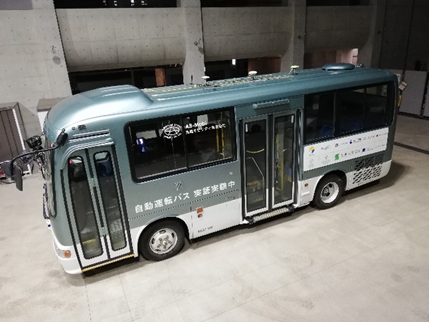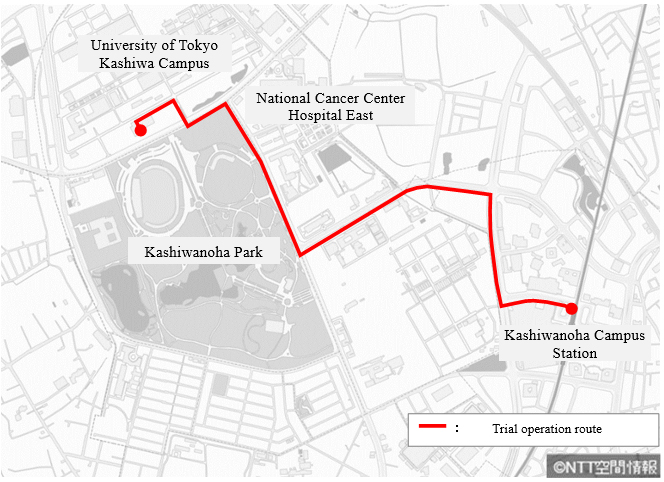Trials of Autonomous Driving Bus Start on Public Roads between Kashiwa-no-ha Campus Station and University of Tokyo Kashiwa Campus
October 24, 2019
Kashiwa ITS Promotion Committee
Mitsui Fudosan Co., Ltd.
The Kashiwa ITS Promotion Committee will start trial operations of an autonomous driving bus in an approx. 1.6-mile (approx. 2.6 km) zone from Kashiwanoha Campus Station on the Tsukuba Express Line to the University of Tokyo Kashiwa Campus. The trials will run for five months from Friday, November 1, 2019 to Tuesday, March 31, 2020.
Technological development of autonomous driving has been proceeding, but most trials have been conducted over short terms, and there have been few cases to verify operation methods involving practical routes, operations, inspections and maintenance carried out over the long term. This trial aims to operate an autonomous driving bus business, ascertain any issues with driving and verify measures to address these. The autonomous driving bus will operate for five months in a zone of approx. 1.6 miles (approx. 2.6 km), comprised of approx. 1.4 miles (approx. 2.3 km) on public roads and 0.2 miles (approx. 300 m) inside the University of Tokyo Kashiwa Campus. The trials will use a commercial vehicle bus (green license plate) equipped with an autonomous driving system developed by Advanced Smart Mobility Co., Ltd. and operated by TOBU BUS EAST CO., LTD. The bus will run at level 2 autonomy, which means the system performs both vertical and horizontal vehicle motion control subtasks in a limited area.
This trial has been positioned as a project related to the Kashiwanoha Smart City Consortium, which the Ministry of Land, Infrastructure, Transport and Tourism has selected as a smart city project and advanced model project. Based on the results of the trial, road performance and safety of the bus will be evaluated with level 4 autonomy or higher in mind, a new autonomous driving bus will be developed and trial operations will continue with new vehicles introduced following this trial. Going forward, the aim is to collaborate with Kashiwanoha neighborhood development to create a safe, comfortable and convenient service for residents.
Conceptual image of the test vehicle

Planned travel route (zone of approx. 1.6 miles (approx. 2.6 km))

Trial Overview
| Dates | Friday, November 1, 2019 to Tuesday, March 31, 2020 * Operations may be halted for reasons including weather, natural disaster or road conditions. * Buses will not operate on weekends, national holidays or from December 29–January 3. |
|---|---|
| Operating hours | Four trips are planned between 11 a.m. and 3 p.m. (of which, 1 trip is a special service) |
| Operating route | Between Kashiwa-no-ha Campus Station on the Tsukuba Express Line and University of Tokyo Kashiwa Campus |
| Distance | Approx. 1.6 miles (approx. 2.6 km) (approx. 1.4 miles (approx. 2.3 km) on public roads and 0.2 miles (approx. 300 m) inside the campus) |
| Vehicle used | Autonomously driven vehicle based on a Liesse from Hino Motors, Ltd. (chartered operation) |
| Passenger capacity | 17 passengers * Bus will not run if passenger capacity is exceeded |
| Level of driving autonomy | Level 2 |
| Passenger eligibility | Students and faculty from the University of Tokyo and visitors to the Kashiwa Campus * In addition to the above, participants in the Gate Square Course of the Kashiwanoha Smart City Tour run by the Urban Design Center Kashiwanoha (UDCK) will be eligible to ride the aforementioned special service. Please check for details below: https://www.kashiwanoha-smartcity.com/en/tour/pc/ |
Kashiwa ITS Promotion Committee (Chairman: Professor Yoshihiro Suda of the Institute of Industrial Science, The University of Tokyo)
The Kashiwa ITS Promotion Committee was established in December 2009 in the city of Kashiwa for the University of Tokyo, government bodies, private companies, various organizations and individuals to cooperate and coordinate to advance various types of research and development to becoming projects and practically utilized for the purpose of using ITS to realize a low-carbon transport and next-generation environmental city.
Overview of Autonomous Driving Levels
| Level 1 | The system performs either vertical or horizontal vehicle motion control subtasks in a limited area |
|---|---|
| Level 2 | The system performs both vertical and horizontal vehicle motion control subtasks in a limited area |
| Level 3 | The system performs all motion tasks in a limited area. In the event of difficulties arising for continued operations, the system requests appropriate intervention |
| Level 4 | The system performs all motion tasks and responds to difficulties arising for continued operations in a limited area |
| Level 5 | The system performs all motion tasks and responds to difficulties arising for continued operations in an unlimited fashion (meaning not in a limited area) |
Groups Participating in the Autonomous Driving Bus Trial
Mobility Innovation Collaborative Research Organization, the University of Tokyo; Institute of Industrial Science, the University of Tokyo; Graduate School of Frontier Sciences, the University of Tokyo; City of Kashiwa; Advanced Smart Mobility Co., Ltd.; TOBU BUS EAST CO., LTD.; Mitsui Fudosan Co., Ltd.; SB Drive Corp.; Urban Design Center Kashiwanoha (UDCK); Pacific Consultants Co., Ltd.; Sompo Japan Nipponkoa Insurance Inc.; Mitsubishi Auto Leasing Corporation
Mitsui Fudosan Co., Ltd.
[WEB] Kashiwanoha Smart City https://www.kashiwanoha-smartcity.com/en/
Mitsui Fudosan has been promoting the Kashiwanoha Smart City urban development project in the area around Kashiwanoha Campus Station on the Tsukuba Express Line in Kashiwa City, Chiba Prefecture since 2005. Aiming to create an urban development model that resolves worldwide issues, the Company is undertaking various initiatives through partnerships among the public, private and academic sectors, based on the three themes of creating “an environmental symbiotic city,” “a city of health and longevity” and “a city of new industry creation.” In terms of new industry creation, Mitsui Fudosan aims to realize a city that creates new industries by connecting people of all ages, fields, and nationalities throughout the entire town, as well as companies at various stages, to spark innovation


























